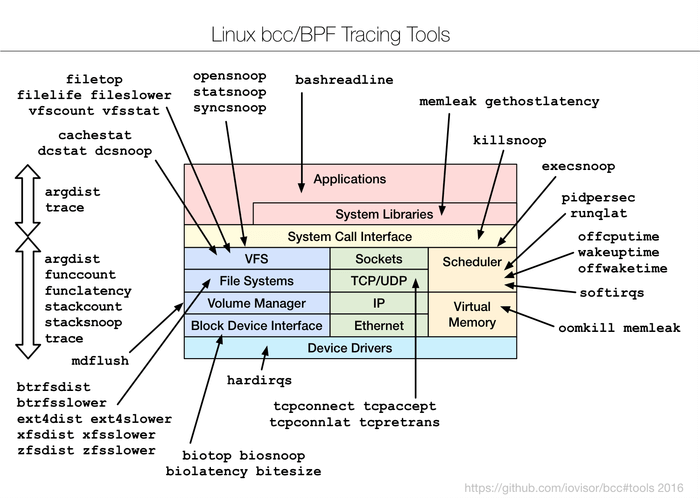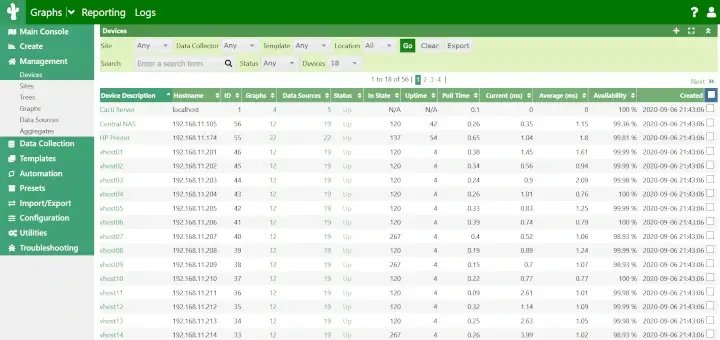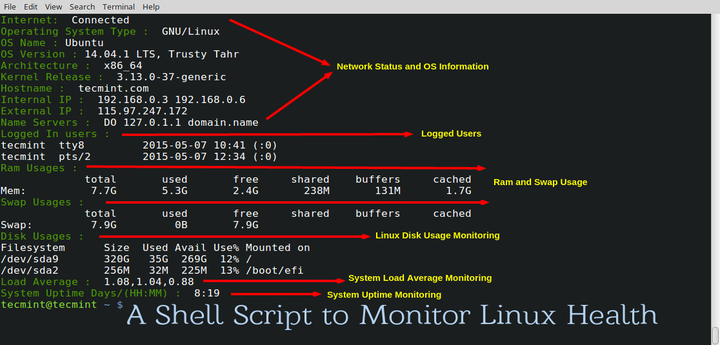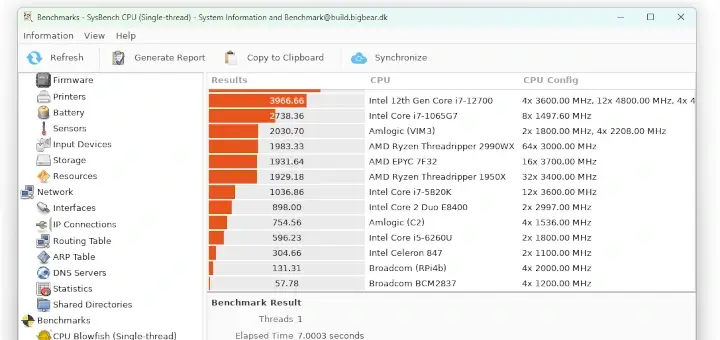BCC (BPF Compiler Collection) is a powerful set of appropriate tools and example files for creating resourceful kernel tracing and manipulation programs. It utilizes extended BPF (Berkeley Packet Filters), initially known as eBPF which was one of the new features in Linux 3.15.

Practically, most of the components used by BCC require Linux 4.1 or above, and its noteworthy features include:
- Requires no 3rd party kernel module, since all the tools work based on BPF which is built into the kernel and BCC uses features added in Linux 4.x series.
- Enables observation of software execution.
- Comprises of several performance analysis tools with example files and man pages.
Suggested Read: 20 Command Line Tools to Monitor Linux Performance
Best suited for advanced Linux users, BCC makes it easy to write BPF programs using kernel instrumentation in C, and front-ends in Python and lua. Additionally, it supports multiple tasks such as performance analysis, monitoring, network traffic control plus lots more.
How To Install BCC in Linux Systems
Remember that BCC uses features added in Linux kernel version 4.1 or above, and as a requirement, the kernel should have been compiled with the flags set below:
CONFIG_BPF=y CONFIG_BPF_SYSCALL=y # [optional, for tc filters] CONFIG_NET_CLS_BPF=m # [optional, for tc actions] CONFIG_NET_ACT_BPF=m CONFIG_BPF_JIT=y CONFIG_HAVE_BPF_JIT=y # [optional, for kprobes] CONFIG_BPF_EVENTS=y
To check your kernel flags, view the file /proc/config.gz or run the commands as in the examples below:
tecmint@TecMint ~ $ grep CONFIG_BPF= /boot/config-`uname -r` CONFIG_BPF=y tecmint@TecMint ~ $ grep CONFIG_BPF_SYSCALL= /boot/config-`uname -r` CONFIG_BPF_SYSCALL=y tecmint@TecMint ~ $ grep CONFIG_NET_CLS_BPF= /boot/config-`uname -r` CONFIG_NET_CLS_BPF=m tecmint@TecMint ~ $ grep CONFIG_NET_ACT_BPF= /boot/config-`uname -r` CONFIG_NET_ACT_BPF=m tecmint@TecMint ~ $ grep CONFIG_BPF_JIT= /boot/config-`uname -r` CONFIG_BPF_JIT=y tecmint@TecMint ~ $ grep CONFIG_HAVE_BPF_JIT= /boot/config-`uname -r` CONFIG_HAVE_BPF_JIT=y tecmint@TecMint ~ $ grep CONFIG_BPF_EVENTS= /boot/config-`uname -r` CONFIG_BPF_EVENTS=y
After verifying kernel flags, it’s time to install BCC tools in Linux systems.
On Ubuntu 16.04
Only the nightly packages are created for Ubuntu 16.04, but the installation instructions are very straightforward. No need of kernel upgrade or compile it from source.
$ echo "deb [trusted=yes] https://repo.iovisor.org/apt/xenial xenial-nightly main" | sudo tee /etc/apt/sources.list.d/iovisor.list $ sudo apt-get update $ sudo apt-get install bcc-tools
On Ubuntu 14.04
Begin by installing a 4.3+ Linux kernel, from http://kernel.ubuntu.com/~kernel-ppa/mainline.
As an example, write a small shell script “bcc-install.sh” with the content below.
Note: update PREFIX value to the latest date, and also browse the files in the PREFIX url provided to get the actual REL value, substitute them in the shell script.
#!/bin/bash
VER=4.5.1-040501
PREFIX=http://kernel.ubuntu.com/~kernel-ppa/mainline/v4.5.1-wily/
REL=201604121331
wget ${PREFIX}/linux-headers-${VER}-generic_${VER}.${REL}_amd64.deb
wget ${PREFIX}/linux-headers-${VER}_${VER}.${REL}_all.deb
wget ${PREFIX}/linux-image-${VER}-generic_${VER}.${REL}_amd64.deb
sudo dpkg -i linux-*${VER}.${REL}*.deb
Save the file and exit. Make it executable, then run it as shown:
$ chmod +x bcc-install.sh $ sh bcc-install.sh
Afterwards, reboot your system.
$ reboot
Next, run the commands below to install signed BCC packages:
$ sudo apt-key adv --keyserver keyserver.ubuntu.com --recv-keys D4284CDD $ echo "deb https://repo.iovisor.org/apt trusty main" | sudo tee /etc/apt/sources.list.d/iovisor.list $ sudo apt-get update $ sudo apt-get install binutils bcc bcc-tools libbcc-examples python-bcc
On Fedora 24-23
Install a 4.2+ kernel from http://alt.fedoraproject.org/pub/alt/rawhide-kernel-nodebug, if your system has a version lower than what is required. Below is an example of how to do that:
$ sudo dnf config-manager --add-repo=http://alt.fedoraproject.org/pub/alt/rawhide-kernel-nodebug/fedora-rawhide-kernel-nodebug.repo $ sudo dnf update $ reboot
After that, add the BBC tools repository, update your system and install the tools by executing the next series of commands:
$ echo -e '[iovisor]\nbaseurl=https://repo.iovisor.org/yum/nightly/f23/$basearch\nenabled=1\ngpgcheck=0' | sudo tee /etc/yum.repos.d/iovisor.repo $ sudo dnf update $ sudo dnf install bcc-tools
On Arch Linux – AUR
You should start by upgrading your kernel to at least version 4.3.1-1, subsequently install the packages below using any Arch package managers such as pacaur, yaourt, cower, etc.
bcc bcc-tools python-bcc python2-bcc
How To Use BCC Tools in Linux Systems
All the BCC tools are installed under /usr/share/bcc/tools directory. However, you can alternatively run them from the BCC Github repository under /tools where they end with a .py extension.
$ ls /usr/share/bcc/tools argdist capable filetop offwaketime stackcount vfscount bashreadline cpudist funccount old stacksnoop vfsstat biolatency dcsnoop funclatency oomkill statsnoop wakeuptime biosnoop dcstat gethostlatency opensnoop syncsnoop xfsdist biotop doc hardirqs pidpersec tcpaccept xfsslower bitesize execsnoop killsnoop profile tcpconnect zfsdist btrfsdist ext4dist mdflush runqlat tcpconnlat zfsslower btrfsslower ext4slower memleak softirqs tcpretrans cachestat filelife mysqld_qslower solisten tplist cachetop fileslower offcputime sslsniff trace
We shall cover a few examples under – monitoring general Linux system performance and networking.
Trace open() syscalls
Let’s start by tracing all open() syscalls using opensnoop. This enable us tell us how various applications work by identifying their data files, config files and many more:
$ cd /usr/share/bcc/tools $ sudo ./opensnoop PID COMM FD ERR PATH 1 systemd 35 0 /proc/self/mountinfo 2797 udisksd 13 0 /proc/self/mountinfo 1 systemd 35 0 /sys/devices/pci0000:00/0000:00:0d.0/ata3/host2/target2:0:0/2:0:0:0/block/sda/sda1/uevent 1 systemd 35 0 /run/udev/data/b8:1 1 systemd -1 2 /etc/systemd/system/sys-kernel-debug-tracing.mount 1 systemd -1 2 /run/systemd/system/sys-kernel-debug-tracing.mount 1 systemd -1 2 /run/systemd/generator/sys-kernel-debug-tracing.mount 1 systemd -1 2 /usr/local/lib/systemd/system/sys-kernel-debug-tracing.mount 2247 systemd 15 0 /proc/self/mountinfo 1 systemd -1 2 /lib/systemd/system/sys-kernel-debug-tracing.mount 1 systemd -1 2 /usr/lib/systemd/system/sys-kernel-debug-tracing.mount 1 systemd -1 2 /run/systemd/generator.late/sys-kernel-debug-tracing.mount 1 systemd -1 2 /etc/systemd/system/sys-kernel-debug-tracing.mount.wants 1 systemd -1 2 /etc/systemd/system/sys-kernel-debug-tracing.mount.requires 1 systemd -1 2 /run/systemd/system/sys-kernel-debug-tracing.mount.wants 1 systemd -1 2 /run/systemd/system/sys-kernel-debug-tracing.mount.requires 1 systemd -1 2 /run/systemd/generator/sys-kernel-debug-tracing.mount.wants 1 systemd -1 2 /run/systemd/generator/sys-kernel-debug-tracing.mount.requires 1 systemd -1 2 /usr/local/lib/systemd/system/sys-kernel-debug-tracing.mount.wants 1 systemd -1 2 /usr/local/lib/systemd/system/sys-kernel-debug-tracing.mount.requires 1 systemd -1 2 /lib/systemd/system/sys-kernel-debug-tracing.mount.wants 1 systemd -1 2 /lib/systemd/system/sys-kernel-debug-tracing.mount.requires 1 systemd -1 2 /usr/lib/systemd/system/sys-kernel-debug-tracing.mount.wants 1 systemd -1 2 /usr/lib/systemd/system/sys-kernel-debug-tracing.mount.requires 1 systemd -1 2 /run/systemd/generator.late/sys-kernel-debug-tracing.mount.wants 1 systemd -1 2 /run/systemd/generator.late/sys-kernel-debug-tracing.mount.requires 1 systemd -1 2 /etc/systemd/system/sys-kernel-debug-tracing.mount.d 1 systemd -1 2 /run/systemd/system/sys-kernel-debug-tracing.mount.d 1 systemd -1 2 /run/systemd/generator/sys-kernel-debug-tracing.mount.d ....
Summarize Block Device I/O Latency
In this example, it shows a summarized distribution of disk I/O latency using biolatecncy. After executing the command, wait for a few minutes and hit Ctrl-C to end it and view the output.
$ sudo ./biolatecncy
Tracing block device I/O... Hit Ctrl-C to end.
^C
usecs : count distribution
0 -> 1 : 0 | |
2 -> 3 : 0 | |
4 -> 7 : 0 | |
8 -> 15 : 0 | |
16 -> 31 : 0 | |
32 -> 63 : 0 | |
64 -> 127 : 0 | |
128 -> 255 : 3 |****************************************|
256 -> 511 : 3 |****************************************|
512 -> 1023 : 1 |************* |
Trace New Processes via exec() Syscalls
In this section, we shall move to tracing new processes in execution using execsnoop tool. Each time a process is forked by fork() and exec() syscalls, it is shown in the output. However, not all processes are captured.
$ sudo ./execsnoop PCOMM PID PPID RET ARGS gnome-screensho 14882 14881 0 /usr/bin/gnome-screenshot --gapplication-service systemd-hostnam 14892 1 0 /lib/systemd/systemd-hostnamed nautilus 14897 2767 -2 /home/tecmint/bin/net usershare info nautilus 14897 2767 -2 /home/tecmint/.local/bin/net usershare info nautilus 14897 2767 -2 /usr/local/sbin/net usershare info nautilus 14897 2767 -2 /usr/local/bin/net usershare info nautilus 14897 2767 -2 /usr/sbin/net usershare info nautilus 14897 2767 -2 /usr/bin/net usershare info nautilus 14897 2767 -2 /sbin/net usershare info nautilus 14897 2767 -2 /bin/net usershare info nautilus 14897 2767 -2 /usr/games/net usershare info nautilus 14897 2767 -2 /usr/local/games/net usershare info nautilus 14897 2767 -2 /snap/bin/net usershare info compiz 14899 14898 -2 /home/tecmint/bin/libreoffice --calc compiz 14899 14898 -2 /home/tecmint/.local/bin/libreoffice --calc compiz 14899 14898 -2 /usr/local/sbin/libreoffice --calc compiz 14899 14898 -2 /usr/local/bin/libreoffice --calc compiz 14899 14898 -2 /usr/sbin/libreoffice --calc libreoffice 14899 2252 0 /usr/bin/libreoffice --calc dirname 14902 14899 0 /usr/bin/dirname /usr/bin/libreoffice basename 14903 14899 0 /usr/bin/basename /usr/bin/libreoffice ...
Trace Slow ext4 Operations
Using ext4slower to trace the ext4 file system common operations that are slower than 10ms, to help us identify independently slow disk I/O via the file system.
Suggested Read: 13 Linux Performance Monitoring Tools
It only outputs those operations that exceed a threshold:
$ sudo ./execslower Tracing ext4 operations slower than 10 ms TIME COMM PID T BYTES OFF_KB LAT(ms) FILENAME 11:59:13 upstart 2252 W 48 1 10.76 dbus.log 11:59:13 gnome-screensh 14993 R 144 0 10.96 settings.ini 11:59:13 gnome-screensh 14993 R 28 0 16.02 gtk.css 11:59:13 gnome-screensh 14993 R 3389 0 18.32 gtk-main.css 11:59:25 rs:main Q:Reg 1826 W 156 60 31.85 syslog 11:59:25 pool 15002 R 208 0 14.98 .xsession-errors 11:59:25 pool 15002 R 644 0 12.28 .ICEauthority 11:59:25 pool 15002 R 220 0 13.38 .bash_logout 11:59:27 dconf-service 2599 S 0 0 22.75 user.BHDKOY 11:59:33 compiz 2548 R 4096 0 19.03 firefox.desktop 11:59:34 compiz 15008 R 128 0 27.52 firefox.sh 11:59:34 firefox 15008 R 128 0 36.48 firefox 11:59:34 zeitgeist-daem 2988 S 0 0 62.23 activity.sqlite-wal 11:59:34 zeitgeist-fts 2996 R 8192 40 15.67 postlist.DB 11:59:34 firefox 15008 R 140 0 18.05 dependentlibs.list 11:59:34 zeitgeist-fts 2996 S 0 0 25.96 position.tmp 11:59:34 firefox 15008 R 4096 0 10.67 libplc4.so 11:59:34 zeitgeist-fts 2996 S 0 0 11.29 termlist.tmp ...
Trace Block Device I/O with PID and Latency
Next off, let’s dive into printing a line per disk I/O each second, with details such as process ID, sector, bytes, latency among others using biosnoop:
$ sudo ./biosnoop TIME(s) COMM PID DISK T SECTOR BYTES LAT(ms) 0.000000000 ? 0 R -1 8 0.26 2.047897000 ? 0 R -1 8 0.21 3.280028000 kworker/u4:0 14871 sda W 30552896 4096 0.24 3.280271000 jbd2/sda1-8 545 sda W 29757720 12288 0.40 3.298318000 jbd2/sda1-8 545 sda W 29757744 4096 0.14 4.096084000 ? 0 R -1 8 0.27 6.143977000 ? 0 R -1 8 0.27 8.192006000 ? 0 R -1 8 0.26 8.303938000 kworker/u4:2 15084 sda W 12586584 4096 0.14 8.303965000 kworker/u4:2 15084 sda W 25174736 4096 0.14 10.239961000 ? 0 R -1 8 0.26 12.292057000 ? 0 R -1 8 0.20 14.335990000 ? 0 R -1 8 0.26 16.383798000 ? 0 R -1 8 0.17 ...
Trace Page Cache hit/miss Ratio
Thereafter, we proceed to using cachestat to displays one line of summarized statistics from the system cache every second. This enables for system tuning operations by pointing out low cache hit ratio and high rate of misses:
$ sudo ./cachestat
HITS MISSES DIRTIES READ_HIT% WRITE_HIT% BUFFERS_MB CACHED_MB
0 0 0 0.0% 0.0% 19 544
4 4 2 25.0% 25.0% 19 544
1321 33 4 97.3% 2.3% 19 545
7476 0 2 100.0% 0.0% 19 545
6228 15 2 99.7% 0.2% 19 545
0 0 0 0.0% 0.0% 19 545
7391 253 108 95.3% 2.7% 19 545
33608 5382 28 86.1% 13.8% 19 567
25098 37 36 99.7% 0.0% 19 566
17624 239 416 96.3% 0.5% 19 520
...
Trace TCP Active Connections
Monitoring TCP connections every second using tcpconnect. Its output includes source and destination address, and port number. This tool is useful for tracing unexpected TCP connections, thereby helping us to identify inefficiencies in application configurations or an attacker.
$ sudo ./tcpconnect PID COMM IP SADDR DADDR DPORT 15272 Socket Threa 4 10.0.2.15 91.189.89.240 80 15272 Socket Threa 4 10.0.2.15 216.58.199.142 443 15272 Socket Threa 4 10.0.2.15 216.58.199.142 80 15272 Socket Threa 4 10.0.2.15 216.58.199.174 443 15272 Socket Threa 4 10.0.2.15 54.200.62.216 443 15272 Socket Threa 4 10.0.2.15 54.200.62.216 443 15272 Socket Threa 4 10.0.2.15 117.18.237.29 80 15272 Socket Threa 4 10.0.2.15 216.58.199.142 80 15272 Socket Threa 4 10.0.2.15 216.58.199.131 80 15272 Socket Threa 4 10.0.2.15 216.58.199.131 443 15272 Socket Threa 4 10.0.2.15 52.222.135.52 443 15272 Socket Threa 4 10.0.2.15 216.58.199.131 443 15272 Socket Threa 4 10.0.2.15 54.200.62.216 443 15272 Socket Threa 4 10.0.2.15 54.200.62.216 443 15272 Socket Threa 4 10.0.2.15 216.58.199.132 443 15272 Socket Threa 4 10.0.2.15 216.58.199.131 443 15272 Socket Threa 4 10.0.2.15 216.58.199.142 443 15272 Socket Threa 4 10.0.2.15 54.69.17.198 443 15272 Socket Threa 4 10.0.2.15 54.69.17.198 443 ...
All the tools above can also be used with various options, to enable the help page for a given tool, make use of the -h option, for example:
$ sudo ./tcpconnect -h
usage: tcpconnect [-h] [-t] [-p PID] [-P PORT]
Trace TCP connects
optional arguments:
-h, --help show this help message and exit
-t, --timestamp include timestamp on output
-p PID, --pid PID trace this PID only
-P PORT, --port PORT comma-separated list of destination ports to trace.
examples:
./tcpconnect # trace all TCP connect()s
./tcpconnect -t # include timestamps
./tcpconnect -p 181 # only trace PID 181
./tcpconnect -P 80 # only trace port 80
./tcpconnect -P 80,81 # only trace port 80 and 81
Trace Failed exec()s Syscalls
To trace failed exec()s syscalls, employ the -x option with opensnoop as below:
$ sudo ./opensnoop -x PID COMM FD ERR PATH 15414 pool -1 2 /home/.hidden 15415 (ostnamed) -1 2 /sys/fs/cgroup/cpu/system.slice/systemd-hostnamed.service/cgroup.procs 15415 (ostnamed) -1 2 /sys/fs/cgroup/cpu/system.slice/cgroup.procs 15415 (ostnamed) -1 2 /sys/fs/cgroup/cpuacct/system.slice/systemd-hostnamed.service/cgroup.procs 15415 (ostnamed) -1 2 /sys/fs/cgroup/cpuacct/system.slice/cgroup.procs 15415 (ostnamed) -1 2 /sys/fs/cgroup/blkio/system.slice/systemd-hostnamed.service/cgroup.procs 15415 (ostnamed) -1 2 /sys/fs/cgroup/blkio/system.slice/cgroup.procs 15415 (ostnamed) -1 2 /sys/fs/cgroup/memory/system.slice/systemd-hostnamed.service/cgroup.procs 15415 (ostnamed) -1 2 /sys/fs/cgroup/memory/system.slice/cgroup.procs 15415 (ostnamed) -1 2 /sys/fs/cgroup/pids/system.slice/systemd-hostnamed.service/cgroup.procs 2548 compiz -1 2 15416 systemd-cgroups -1 2 /run/systemd/container 15416 systemd-cgroups -1 2 /sys/fs/kdbus/0-system/bus 15415 systemd-hostnam -1 2 /run/systemd/container 15415 systemd-hostnam -1 13 /proc/1/environ 15415 systemd-hostnam -1 2 /sys/fs/kdbus/0-system/bus 1695 dbus-daemon -1 2 /run/systemd/users/0 15415 systemd-hostnam -1 2 /etc/machine-info 15414 pool -1 2 /home/tecmint/.hidden 15414 pool -1 2 /home/tecmint/Binary/.hidden 2599 dconf-service -1 2 /run/user/1000/dconf/user ...
Trace Particular Process Functions
The last example below demonstrates how to execute a custom trace operation. We are tracing a particular process using its PID.
Suggested Read: Netdata – A Real-Time Performance Monitoring Tool for Linux
First determine the process ID:
$ pidof firefox 15437
Later on, run the custom trace command. In the command below: -p specifies the process ID, do_sys_open() is a kernel function that is traced dynamically including its second argument as a string.
$ sudo ./trace -p 4095 'do_sys_open "%s", arg2' TIME PID COMM FUNC - 12:17:14 15437 firefox do_sys_open /run/user/1000/dconf/user 12:17:14 15437 firefox do_sys_open /home/tecmint/.config/dconf/user 12:18:07 15437 firefox do_sys_open /run/user/1000/dconf/user 12:18:07 15437 firefox do_sys_open /home/tecmint/.config/dconf/user 12:18:13 15437 firefox do_sys_open /sys/devices/system/cpu/present 12:18:13 15437 firefox do_sys_open /dev/urandom 12:18:13 15437 firefox do_sys_open /dev/urandom 12:18:14 15437 firefox do_sys_open /usr/share/fonts/truetype/liberation/LiberationSans-Italic.ttf 12:18:14 15437 firefox do_sys_open /usr/share/fonts/truetype/liberation/LiberationSans-Italic.ttf 12:18:14 15437 firefox do_sys_open /usr/share/fonts/truetype/liberation/LiberationSans-Italic.ttf 12:18:14 15437 firefox do_sys_open /sys/devices/system/cpu/present 12:18:14 15437 firefox do_sys_open /dev/urandom 12:18:14 15437 firefox do_sys_open /dev/urandom 12:18:14 15437 firefox do_sys_open /dev/urandom 12:18:14 15437 firefox do_sys_open /dev/urandom 12:18:15 15437 firefox do_sys_open /sys/devices/system/cpu/present 12:18:15 15437 firefox do_sys_open /dev/urandom 12:18:15 15437 firefox do_sys_open /dev/urandom 12:18:15 15437 firefox do_sys_open /sys/devices/system/cpu/present 12:18:15 15437 firefox do_sys_open /dev/urandom 12:18:15 15437 firefox do_sys_open /dev/urandom ....
Summary
BCC is a powerful and easy-to-use toolkit for various System administration tasks such as tracing system performance monitoring, tracing block device I/O, TCP functions, file system operations, syscalls, Node.js probes, plus lots more. Importantly, it ships in with several example files and man pages for the tools to guide you, making it user friendly and reliable.
Last but not least, you can get back to us by sharing your thoughts about the subject, ask questions, make useful suggestions or any constructive feedback via the comment section below.
For more information and usage visit: https://iovisor.github.io/bcc/






